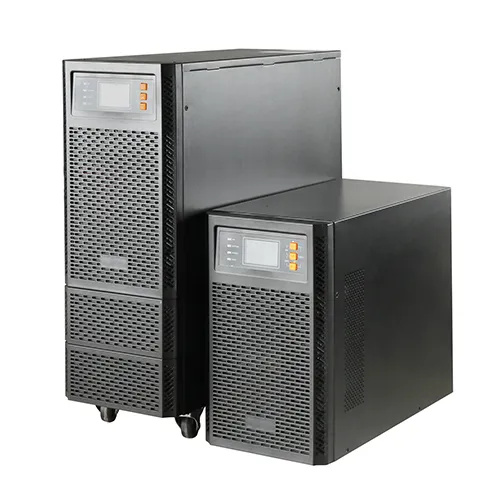Online UPS and Offline UPS, also known as Standby UPS, are two different types of power backup systems that provide a temporary source of power during electrical outages. Here are the key differences between them:

1. Operation:
1). Online UPS: In an online UPS, the connected equipment is constantly powered by the inverter, which is supplied by the battery and is continuously being charged by the AC power source. The incoming AC power is first converted to DC, then inverted back to AC, ensuring a seamless and uninterrupted power supply to the connected devices.
2). Offline UPS: In an offline UPS, the connected equipment is normally powered directly by the AC mains supply. The UPS monitors the mains power, and when a power outage is detected, the UPS switches to battery power and inverts it to AC to provide power to the devices. There is a brief transfer time during which the devices might experience a small interruption.
2. Switching Time:
1). Online UPS: Since the equipment is constantly powered by the inverter, there is virtually no switching time required during a power outage. This results in a seamless transition and uninterrupted power supply.
2). Offline UPS: There is a short switching time during which the UPS switches from the mains power to battery power. This switching time is typically in milliseconds, but it can lead to a small disruption in power supply to sensitive equipment.
3. Protection and Output Quality:
1). Online UPS: Online UPS systems provide better protection and higher-quality power output. They filter out most power disturbances, such as surges, spikes, and fluctuations, ensuring that the connected equipment receives a stable and clean power supply.
2). Offline UPS: While offline UPS systems do offer some protection against power spikes and surges, they might not be as effective as online UPS systems in maintaining a stable output during all types of power anomalies.
4. Efficiency:
1). Online UPS: Online UPS systems are generally less efficient compared to offline UPS systems. This is because they continuously operate the inverter and battery charger, resulting in some energy loss due to conversion processes.
2). Offline UPS: Offline UPS systems are more energy-efficient since they only activate the inverter and battery when a power interruption occurs.
5. Applications:
1). Online UPS: Online UPS systems are suitable for critical applications where even the slightest power interruption is unacceptable, such as data centers, hospitals, and sensitive industrial processes.
2). Offline UPS: Offline UPS systems are suitable for applications where a brief interruption in power is tolerable, such as personal computers, home electronics, and small business setups.
In summary, the main distinction between online and offline UPS systems lies in how they handle power supply during outages and the level of protection they offer. Online UPS provides continuous power through its inverter, while offline UPS switches to battery power when a power outage is detected. The choice between the two depends on the criticality of the connected equipment and the desired level of protection.
 English
English
 Español
Español
 Português
Português
 русский
русский
 français
français
 日本語
日本語
 Deutsch
Deutsch
 Tiếng Việt
Tiếng Việt
 Italiano
Italiano
 Nederlands
Nederlands
 ไทย
ไทย
 Polski
Polski
 한국어
한국어
 Svenska
Svenska
 magyar
magyar
 Malay
Malay
 বাংলা
বাংলা
 Dansk
Dansk
 Suomi
Suomi
 हिन्दी
हिन्दी
 Pilipino
Pilipino
 Türk
Türk
 Gaeilge
Gaeilge
 عربى
عربى
 Indonesia
Indonesia
 norsk
norsk
 اردو
اردو
 čeština
čeština
 Ελληνικά
Ελληνικά
 Українська
Українська
 Javanese
Javanese
 فارسی
فارسی
 தமிழ்
தமிழ்
 తెలుగు
తెలుగు
 नेपाली
नेपाली
 Burmese
Burmese
 български
български
 ລາວ
ລາວ
 Latine
Latine
 Қазақ
Қазақ
 Euskal
Euskal
 Azərbaycan
Azərbaycan
 slovenský
slovenský
 Македонски
Македонски
 Lietuvos
Lietuvos
 Eesti Keel
Eesti Keel
 Română
Română
 Slovenski
Slovenski
 Српски
Српски
 Беларус
Беларус


